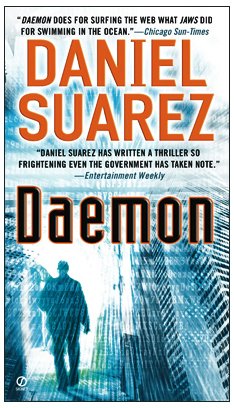School started today, and I'm getting ready for a rush of productivity: new projects, new clients, and new writing projects. But first, let me recommend a few books I read this summer. It's not exactly "what I did on summer vacation," but they might just kick-start some ideas that aren't part of your typical day.
 I read Jeffrey Carr's Inside Cyber Warfare back in the spring, so when Richard Clarke's Cyber War started getting mainstream coverage, I knew I needed to read it. Carr made the point that we need better computer security on systems that do important things, but Clarke really bangs the drum and demands attention. Plus, his background guarantees that he gets attention when he wants it.
I read Jeffrey Carr's Inside Cyber Warfare back in the spring, so when Richard Clarke's Cyber War started getting mainstream coverage, I knew I needed to read it. Carr made the point that we need better computer security on systems that do important things, but Clarke really bangs the drum and demands attention. Plus, his background guarantees that he gets attention when he wants it.
Clarke emphasizes the nightmare scenarios—power outages, train wrecks, and refinery explosions—so it's not bedtime reading, but if you stick with it through the scary parts, he makes some good points. If you've never thought about how quickly the lights can go out, this might be a wake-up call.
 Over dinner at a conference (what do you mean, cyber attacks aren't dinner conversation?), Clarke's book drew a laugh and the comment that I was reading science fiction after starting with the science (Carr). But the real science fiction scare came from Daniel Suarez's Daemon, recommended by my old friend Dave Thomas. Daemon is the story of an AI (articial intelligence) from the world of MMORPGs (massively multiplayer online role-playing games) that takes over the world. If you believe this is possible, you might change your mind about the Internet off switch. Or at least check your offline contingency plans.
Over dinner at a conference (what do you mean, cyber attacks aren't dinner conversation?), Clarke's book drew a laugh and the comment that I was reading science fiction after starting with the science (Carr). But the real science fiction scare came from Daniel Suarez's Daemon, recommended by my old friend Dave Thomas. Daemon is the story of an AI (articial intelligence) from the world of MMORPGs (massively multiplayer online role-playing games) that takes over the world. If you believe this is possible, you might change your mind about the Internet off switch. Or at least check your offline contingency plans.
And oh, look, there's a sequel. Who needs sleep?
 Vinnie Mirchandani's The New Polymath celebrates innovation in, and especially at the intersections of, various technology specialties. It's loaded with examples, and if you're like me—interested in too many topics to pick just one—it provides affirmation that that's ok.
Vinnie Mirchandani's The New Polymath celebrates innovation in, and especially at the intersections of, various technology specialties. It's loaded with examples, and if you're like me—interested in too many topics to pick just one—it provides affirmation that that's ok.
The only problem I had with this book is that Mirchandani makes a major point about And not Or thinking, and people might think I got that from his book. It's really just something that becomes obvious when you regularly share ideas that cross boundaries. The New Polymath is great for pointing out ideas from many fields and connecting them to meaningful outcomes; read it and you'll be challenged and inspired, whatever your usual niche.
The summer's been long and hot—and realistically, we have another month to go before fall weather arrives here—but these books started the gears moving. Now we'll see what happens as a result.
 What can you learn online? How about where someone is? Or where they live, where they work, where they hang out… One of the interesting ways to segment social media data is by the contributor's location, but it's a rare feature in social media analysis platforms because of the difficulty of doing it well. More than they realize, though, people are publishing their locations.
What can you learn online? How about where someone is? Or where they live, where they work, where they hang out… One of the interesting ways to segment social media data is by the contributor's location, but it's a rare feature in social media analysis platforms because of the difficulty of doing it well. More than they realize, though, people are publishing their locations. Bingo!
Bingo!